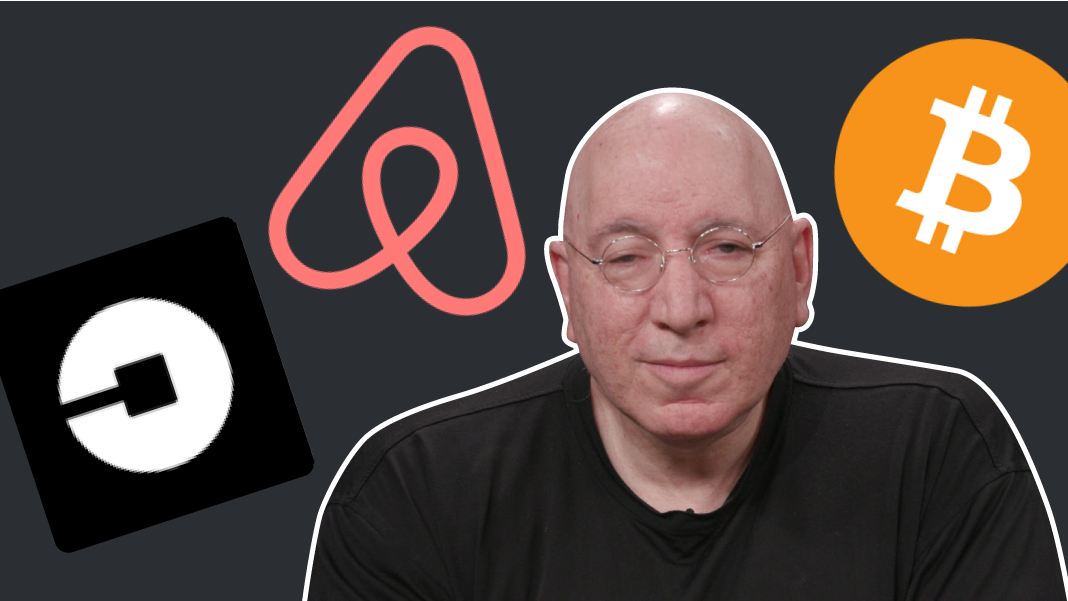- Jeffrey Wernick is an independent investor whose portfolio includes early holdings in Uber and Airbnb. Wernick was also an early investor in bitcoin. He started buying it in 2009, the year it was created.
- Wernick’s initial interest in bitcoin was not just speculation that the price would rise. He believes bitcoin’s value comes from its ability to solve the biggest problems with fiat money.
- Wernick believes the ability to run large deficits and debase the currency changes the relationship between the government and its citizens. He believes it gives the government the ability to do things without the consent of the people.
- Wernick says bitcoin solves these problems because it is a “people’s currency, it’s defined by the people, and it’s defined by rules and a protocol that people trust.”
Jeffrey Wernick is a hard money advocate and an independent investor. His angel investment portfolio includes early holdings in Uber and Airbnb. Wernick serves on the advisory boards of DataWallet and Qtum. He started his career at Salomon Brothers and the National Bank of Detroit. Wernick founded, then sold, the risk management firm AVI Portfolio Services Company, Inc. before focusing on his private investment portfolio. Following is a transcript of the video.
Sara Silverstein:We’vebeen good friends since 2010 and ever since I’ve known you, you’ve been telling me to buy bitcoin. When did you actually buy bitcoin?
Jeffrey Wernick: I initially acquired bitcoin in 2009.
Silverstein: Wow, so the first year that it was around?
Wernick: Yes.
Silverstein: And what made you think that bitcoin wasgoing tobe the future?
Wernick: Well, that has to go back prior to bitcoin itself, and really with my first interest in hard money. My interestwithhard money really began in 1971 when Nixon suspended convertibility ofdollars into -gold into dollars.In I think August of '70 -of 1971, I was someoneas a - young,assomeone in junior high, high school, and actually in elementary school, I became, verykind of,obsessed with the Constitution, the initial period, and prior to the Constitution,the Articles of Confederation, some of the debates during the Constitution between the Federalists and theAnti-Federalists,and the debates between Hamilton and Jefferson regarding the national bank, and alsowithin the Constitution,there was a specific definition of the dollar in terms of gold and silver. So when that link was officially terminated in 1971,my belief was, and I was only 15 years old at the time, that that would cause a debasement of our currency, where we'd have high inflationand that's when Connally famously said that it's our currency, but their problem, to Europe.And it'salso when Simon and Kissinger went to meet with the Saudis and began the petrodollars.
So wehad to create another reason for people to hold dollars, since we couldn't do it through good monetary fiscal policy, we'd dothroughforce by basically having the all of oil invoicein dollars,so that way, central banks would not - they wouldbasically collateralizeby oil rather than gold.So thatbegan the terms of when we had a period of high inflation and complete debasement of our currency, andI became very, very interestedin basically a strong currency for multiple reasons.Because what was one of the reasons that drove that was we began to have the periods of deficit finance.
So throughout our history, we basically had run a reasonably balanced budget and a reasonably small government, and now we were at war, we had the welfare state,and we started running big deficits,and debasing our money. So I thought that it was changing the relationship between the citizen andthegoverned, and who governs us. And I much prefer when a government gets the consent of the people for whatever it does, and the consent means, "Iwant tospend this money.Will you pay the taxes to support this spending?"AndI think that builds a much better relationship than one where the government says, "I'mgoing tospend whatever I spend, but don't worry aboutit. I'mgoing toborrow money and I'mgoing torun a monetary policy,that'll mean don't ever worry about,you ever thinking that you'll ever haveto pay this debt off, it's all a game anyway." So that basically has ended the relationship.Now the government can do a lot of things without the consent of the people, becauseas long as the people don't have to pay for it, they feel that they're less interested in it.
Now the government can do a lot of things without the consent of the people, becauseas long as the people don't have to pay for it, they feel that they're less interested in it.
So initially my interest in it was not just economic, it was also an issue of the fact of what would foster a good relationship between citizens and the government. And if the governmentdoesn't - and if the governmentdebasesitsmoney, what should a citizen have the right to do to preserve itself when the government is acting not in the citizen's best interest? SoI became very, very interested in the issues of money, and that's also why I chose to study at the University of Chicago, because you wanted to go to school where... wheremonetary economics, you know, Milton Friedman was there, and the monetarists, and the quantity theory of money.
SoI became very, very interested in gold and monetary theory. AndI was very anti-Keynesian and veryanti -againstgovernmentstrying to manipulate and manage aggregatedemand. When I got to Chicago, though, I got disappointed,because ultimately I sawat U of Chicago, they also liked to manage aggregate demand, they just thought fiscal policy was less effective than monetary policy.And soI was very disappointed with the fact of, one is I really didn't support independent central bank. I don't support central banking to begin with,but if we're going to have central banking,I'd rather have it accountable to societythan acompletely unaccountable,you know,run by technocrats. For people that espouse limited government, it's sort of like, weird to have a central bank that's not accountable to anybody or anything.So for me, Friedman's support of an independent central bank seemed very inconsistent with his, quote, libertarian rhetoric.So Ithink, ultimately, central banking is what's enabled governments to grow as much as they have because they enable governments to spend with absolutely no discipline involved.
Silverstein:And what problem with money doescryptocurrencysolve for you?
Wernick:I think that with respect to- there's several issues with money that crypto solves. I think first is: Who issuesit? Okay, it's decentralized.So right now, nobody knows who Satoshi is, so essentially there's no author. Wewere delivereda protocol and we were delivered a protocol with incentives for people to produce it.And thepeoplewhoproduce it, produce itjust based upon the design that incentivizes them to produce it.And theincentive mechanism is so well designed up tonow,even though I know some people are concerned about some level of concentration, that it has avoided the double spending problem that, essentially, itcan't be - it hasn't been counterfeited.So nobody's been able to go in and counterfeit a digital currency yet.
Sowe have a currency that can't be counterfeited, that we kind of know the rules under whichhow it's created, and we know there's a hard budget constraint in how many are gonna be issued. And its distribution through the system is not determined by any authority.
So it's a people's currency, it's defined by the people, and it's defined by rules and a protocol that people trust.
So it's not like somebody says, "If I need to have economic growth,I'mgoing togive this institution money,and they'regoing totransmit itto a certain universe of people."Okay, that ultimately, everybody has the same access to it at any point in time, just different units of it according to whatever their own personal budget constraints are. But nobody has privileged access to it, except, you could say, maybe the miners who pay to produce it and they take a business risk associated with it and anybody could choose to get into the mining business.
So it's a people's currency, it's defined by the people, and it's defined by rules and a protocol that people trust. AndI think in a world where people don't trust anything anymore, that it's good to have protocols that people trust that they control themselves,that are not controlled by third parties.










